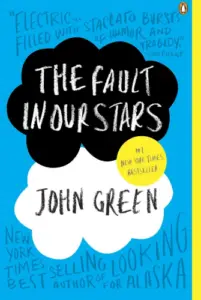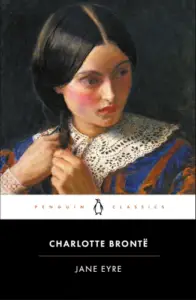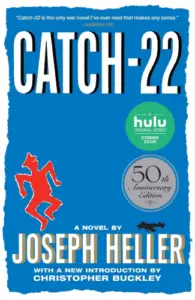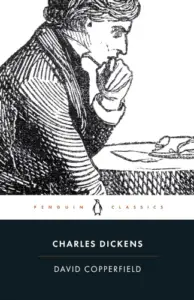The Book Thief
Book Author: Markus Zusak
Summary reviewed by:
Terrence Timmons
Terrence Timmons
Analyst
Bachelor of Arts (BA), University Of California, Santa Barbara 2019
With over 4 years of experience as an analyst. Terrence Timmons is committed to analyzing summaries without compromising on quality.
The Book Thief: Summary
What if Death himself told you a story? The Book Thief plunges readers into the heart of Nazi Germany, where Liesel Meminger, a young girl who has lost her family, learns to survive through the power of words. Set in the fictional town of Molching, near Munich, the novel spans the years of World War II, narrated by Death—a weary yet curious observer of humanity’s best and worst moments. Liesel's story begins when she is sent to live with foster parents, Hans and Rosa Hubermann. Despite the grim realities around her, she finds comfort in stealing books and learning to read, thanks to the kindness of Hans.
As the war looms over them, the Hubermanns hide a Jewish fist-fighter named Max Vandenburg in their basement. The bond between Liesel and Max becomes a central pillar of the novel, as they both battle the horrors of the time with the solace of stories. Through these stolen words, Liesel confronts the brutality of war, the power of love, and the irrevocable losses she faces along the way. Zusak’s writing, filled with poetic language, offers a stark portrayal of life during wartime from the perspective of an ordinary girl, making it both a coming-of-age story and a haunting reflection on human cruelty.
Though not part of a series, The Book Thief stands alone as a novel that explores how even in the darkest times, words have the ability to provide hope, connection, and a lifeline.
Spoilers (watch a short ad to reveal spoilers)
The Book Thief: Genres
Historical Fiction
War Fiction
Holocaust Literature
Coming of Age
Bildungsroman
The Book Thief: Main Characters
Liesel Meminger: A resilient and curious girl who values words and their power. Her determination to learn to read in a time of immense hardship shows her commitment to knowledge and growth. She deeply cares for her loved ones, exemplified in her relationship with Max, where she reads to him to offer comfort during his confinement.
Hans Hubermann: Liesel’s gentle foster father, who values kindness and loyalty above all else. He teaches Liesel to read and risks his life by hiding Max, showcasing his moral courage and compassion in the face of oppression.
Rosa Hubermann: Liesel’s sharp-tongued but loving foster mother, whose tough exterior hides a heart of gold. She values family and survival, showing her love in practical ways like ensuring there’s food on the table, even during tough times.
Max Vandenburg: A Jewish man hidden by the Hubermanns, Max values friendship and survival. His bond with Liesel grows through their shared love of stories, and despite his circumstances, he maintains hope and strength, creating a hand-drawn book for Liesel as a gesture of gratitude.
Rudy Steiner: Liesel’s best friend, full of mischief and bravery. Rudy values loyalty and fairness, which is most evident when he repeatedly stands by Liesel and dreams of justice, as seen in his defiant attempts to emulate his idol, Jesse Owens, despite the dangerous racial climate.
The Book Thief: Themes
The Power of Words: Words are depicted as both destructive and healing. Liesel learns that words can influence people, shape ideologies, and offer comfort in the most trying times, as seen in her reading to Max and the stolen books that become her solace.
Death and Humanity: The book, narrated by Death, offers a reflection on mortality and the human condition. Death muses on the duality of humanity’s beauty and cruelty, as shown in the small acts of kindness amidst the horrors of the war.
Friendship and Sacrifice: Relationships play a crucial role in the story, especially the friendships that form under the direst circumstances. Liesel’s relationships with Rudy, Max, and her foster parents are built on loyalty and selflessness, underscoring the importance of human connection in survival.
War and Its Impact on Innocence: The story vividly illustrates how war strips away innocence, especially for children like Liesel and Rudy, who are forced to navigate a world of violence and loss, growing up far too quickly due to the brutal reality surrounding them.
Survival: The characters in the novel are all struggling to survive in one way or another. Whether it’s Max hiding from the Nazis, Liesel stealing books, or the Hubermanns trying to make ends meet, the fight for survival is a central theme in every character’s arc.
The Book Thief: What You Need to Know
(Contains Spoilers: Perfect for readers seeking a quick review.)
The Book Thief is set during World War II and follows Liesel Meminger as she grows up in Nazi Germany, under the care of her foster parents, Hans and Rosa Hubermann. The novel begins with Liesel on a train to Molching after the death of her younger brother. Traumatized, she arrives at the Hubermanns’ home and struggles to adjust, haunted by nightmares of her brother. Hans, her kind-hearted foster father, helps her by teaching her to read. Liesel becomes obsessed with words and begins stealing books, finding in them an escape from the harsh realities around her.
As the war intensifies, the Hubermanns take in Max Vandenburg, a Jewish man seeking refuge. Max and Liesel form a close bond, sharing stories and dreams. Liesel reads to Max while he hides in the basement, offering him comfort and a connection to the world beyond the war. Meanwhile, Liesel’s friendship with Rudy Steiner, a boy in her neighborhood, becomes another central focus of her life. They share many adventures, including stealing books and food, and Rudy’s loyalty to Liesel remains unwavering.
Tension builds as Nazi ideology seeps into everyday life. The Hubermanns live in constant fear of being discovered for hiding Max. Liesel’s exposure to the brutality of the regime deepens as she witnesses bombings, public executions, and the destruction of families around her. Despite these atrocities, she clings to the power of words, writing her own story, The Book Thief, which Death, the novel’s narrator, later recovers.
In the novel’s devastating conclusion, Molching is bombed, and Liesel’s world is shattered. She loses her foster parents and Rudy in the bombing, but Max survives the war and is eventually reunited with Liesel. The novel ends with Death reflecting on Liesel’s life, revealing that she grows old and reflects on the losses she endured during her youth.
Death, ever-present throughout the story, offers a haunting and philosophical meditation on the resilience of the human spirit and the inevitable tragedies that come with life.
The Book Thief: Methodology
At the heart of our summaries is User-Focused Content & Experience—we prioritize what resonates with readers, ensuring the essence of a book like The Book Thief captivates and informs. Through Expert Analysis, we delve deep into key themes such as the power of words and friendship, distilling Markus Zusak’s profound messages. With a commitment to Quality and Integrity, we carefully maintain accuracy, offering clear, insightful recaps of pivotal moments, like Liesel’s bond with Max and the loss she endures, ensuring our summaries are both faithful and enriching.
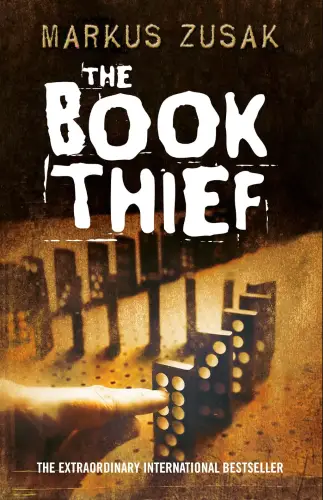

The Book Thief
Date Published: 2005
Disclaimer: As an Amazon Associate I earn from qualifying purchases.

